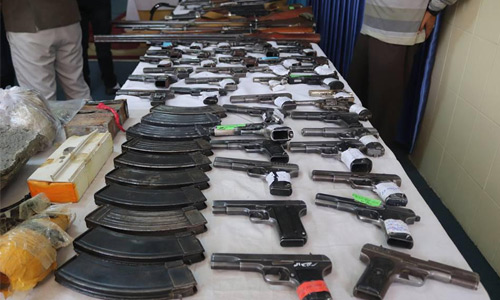Though Kabul is the center of social and economic decision making and expected to be one of the secure provinces in the country, almost every day or every week, there are reports about social crimes including looting residential houses, kidnappings, killing, assassination and hostage-taking. Before discussing about the cause and effect of this never ended problem, let’s share some recent examples which happened in a single weak in the capital city. The first criminal case happened on March 7 in west of Kabul city on Robabeh Mohammadi’s painting workshop where two wounded and her workshop facilities were entirely destroyed. Robabeh Mohammadi is a painter with disability but well-known for her painting skills and unique talents. The second case happened in the 8th security district of Kabul city in which four family members were mysteriously killed. Though the security officials have not confirmed the nature of case, the reminder family harshly criticized the security officials due to late inspection and ultimately transferring to forensic medicine for clarification. The third case happened on a Logar Provincial council member, Nasir Ghairat, who was killed with his two bodyguards in March 8 in an attack in the capital city. These cases were happened simultaneously with the recent attacks on anniversary of national unity martyred Abdul Ali Mazari where at least 32 civilians were killed and about 180 others injured by two gunmen.
These successive social and terrorists events have created waves of fears and criticisms in the capital city. In regard to social criminals, the complaints and criticisms are raised through a series of questions such as why the security officials are not able to control the successive robbery and criminal events. Are the criminals and robbers equipped with atomic bomb or modern weapons that police are not? Are the police structure and security facilities enough to cope with the consecutive crimes? Are the robbers and criminals also supported by the neighboring or regional countries that we are not able to fight with or these cases are happening because of corruptions and inability of the justice systems? And finally, what will be the consequences of the never-ended problems? Logically, there must be some causes behind every effect or phenomena.
In order to respond the above mentioned questions, the criminal phenomena should be discussed from two different dimensions: the causes and the consequences. The criminal offenses are an anti-social phenomenon that disrupts the order and security of the community is committed with specific goals and motives. The main factors and motives of increasing social crimes in Kabul are not too complex and ambiguous to be investigated. The first and most important factor of social crimes is poverty and unemployment. Initially, poverty may compel an innocent citizen to commit social crime while it is against his natural will and conscience, but gradually it can become a part of his personality and alter to a professional criminal. Therefore, in many advanced countries, government allocates a substantial amount of money as security allowance paying to unemployed and weak people.
The second factor which widely mentioned in the media and among the people is corruption and culture of impunity which originate from the weak justice system in the country. The justice system of Afghanistan is one most repeated blamed institution which considered responsible for the culture of impunity in the country. Recently, one of the top security officials was arrested in Kabul due to having link with drug smugglers in Kabul city. According to a report which was released in recent years about 750 criminals were sentenced to death penalty in Afghanistan due to their heavy crimes but none of the death warrant was implemented yet. Based on a BBC report from 2013 to 2017 only one person was executed and reportedly six others in recent years while there are about 35 or36 thousand prisoners who are responsible for heavy or un-heavy crimes in the country. Therefore, we do not only need to implement the rule of law but also need to strengthen the current police structure and increase their salaries to avoid corruption and cover the entire parts of the crowed city.
If we do not promote the rule of law and if we do not empower the police structure in the country, it is not possible to see reduction in social crimes. The consequences of kindhearted behavior with relentless criminals will not only undermine the lives of thousands of innocent citizens but also act as serious factor for capital outflow from the country. With everyday Killing, looting and kidnapping, the traders and investors will be compelled to leave the country. So, the economical consequences will not only be capital outflow but also brain drain from the country. In addition, the social crimes will also inflict a lot of psychological effects on lives of people and a negative impact on social security decreasing government legitimacy. Availing the opportunity, the enemies of the security will also circulate rumors through various channels to sabotage the social tranquility.
Finally, it must be r-emphasized that penalizing strategy is important but not enough; therefore, it merely will not provide a positive outcome. As a result, we must initiate certain poverty reduction strategy and employment program to mitigate the issues in longer run. Meanwhile, none the preventive strategies will entirely reduce the crimes to reach in zero level as it is too difficult or impossible. So, crime is an inevitable phenomenon of society which needs endless fights and constantly updated strategies to reduce crime.
Home » Opinion » Social Crimes: A Never-Ended Problem in Kabul City
Social Crimes: A Never-Ended Problem in Kabul City
| Mohammad Zahir Akbari

